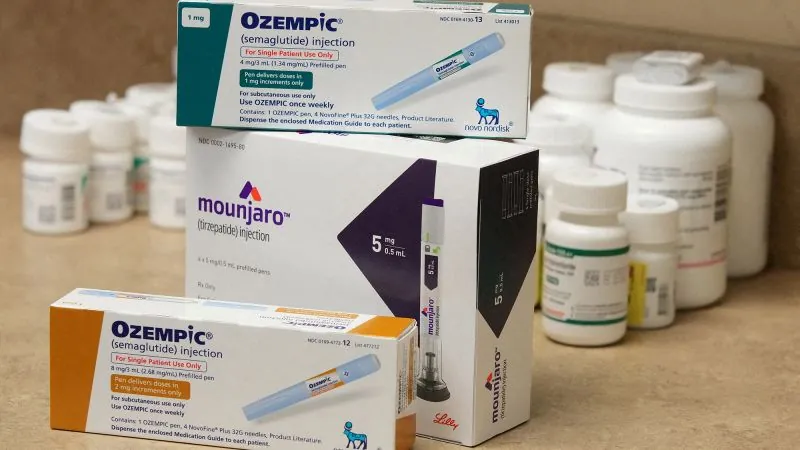
New Research Reveals Surprising Health Benefits of GLP-1 Medications Beyond Weight Loss
2025-01-20
Author: Ken Lee
Introduction
Exciting new research suggests that well-known GLP-1 medications—originally approved for managing weight loss, diabetes, and heart disease—may also have unexpected applications in treating substance use disorders, psychosis, infections, cancer, and even dementia. This groundbreaking study highlights the multifaceted potential of these drugs, known for their ability to aid in weight management and blood sugar regulation.
Study Findings
The study, published in the prestigious journal *Nature Medicine*, analyzed the health records of nearly 2 million diabetes patients, revealing both the benefits and risks associated with GLP-1 medications like Ozempic, Wegovy, Mounjaro, and Zepbound. Although the overall findings indicate that users of these medications were at lower risk for 42 different health outcomes—such as aspiration pneumonia and liver failure—they also faced an increased risk for 19 adverse effects, particularly related to the digestive system, including nausea, vomiting, and gastric paralysis.
Cautions from Lead Researcher
Lead researcher Dr. Ziyad Al-Aly cautioned against viewing these findings as a green light for indiscriminate use: “The side effects are real, and I recommend discussing any potential treatment with a healthcare provider to consider individualized risk-benefit analysis.”
Concerns on Health Risks
While the research did indicate a drop in obesity rates in the U.S., it also underlined concerns like an increased likelihood of developing joint and bone issues, including arthritis, among GLP-1 users.
Dementia and Neurological Effects
One remarkable aspect of this study is its comprehensive approach. Dr. Al-Aly and his team noted a 12% reduction in dementia risk among patients using GLP-1 medications—a finding that may warrant further investigation given the medications' potential neurological effects. Notably, the study identified a surprising correlation between these medications and reduced risks for psychotic disorders, which had previously gone unexamined in large-scale studies. The possibility that they could reduce symptoms in conditions such as schizophrenia has sparked both interest and surprise in the medical community.
Implications for Eating Disorders
Additionally, the study encourages further scrutiny into the medications' impact on individuals with eating disorders. Preliminary observations suggested a link between GLP-1 use and reduced incidences of bulimia, yet the implications for other eating disorders like binge-eating disorder remain unclear.
Mental Health Benefits
Most notably, unlike some weight-loss medications of the past that have been associated with negative mental health outcomes, this research found that GLP-1 medications might actually lower the risk of suicidal ideation.
Historical Inspiration and Future Research
Dr. Al-Aly was inspired by the historical evolution of statins, which were once only understood to lower cholesterol, but later acknowledged for their broader health benefits. He sees the importance of leveraging big data to evaluate the hidden effects of medications like GLP-1.
Conclusion
As scientists pursue more extensive research into these findings, the prospect of GLP-1 medications serving as treatment alternatives for various conditions emerges as a tantalizing possibility. The future could hold not only better options for those pursuing weight loss but also enhanced therapies for managing significant mental health issues and chronic diseases. As the medical community continues to unravel the complexities of GLP-1 medications, one thing remains clear: the full spectrum of their health benefits is only beginning to be discovered.


 Brasil (PT)
Brasil (PT)
 Canada (EN)
Canada (EN)
 Chile (ES)
Chile (ES)
 Česko (CS)
Česko (CS)
 대한민국 (KO)
대한민국 (KO)
 España (ES)
España (ES)
 France (FR)
France (FR)
 Hong Kong (EN)
Hong Kong (EN)
 Italia (IT)
Italia (IT)
 日本 (JA)
日本 (JA)
 Magyarország (HU)
Magyarország (HU)
 Norge (NO)
Norge (NO)
 Polska (PL)
Polska (PL)
 Schweiz (DE)
Schweiz (DE)
 Singapore (EN)
Singapore (EN)
 Sverige (SV)
Sverige (SV)
 Suomi (FI)
Suomi (FI)
 Türkiye (TR)
Türkiye (TR)
 الإمارات العربية المتحدة (AR)
الإمارات العربية المتحدة (AR)